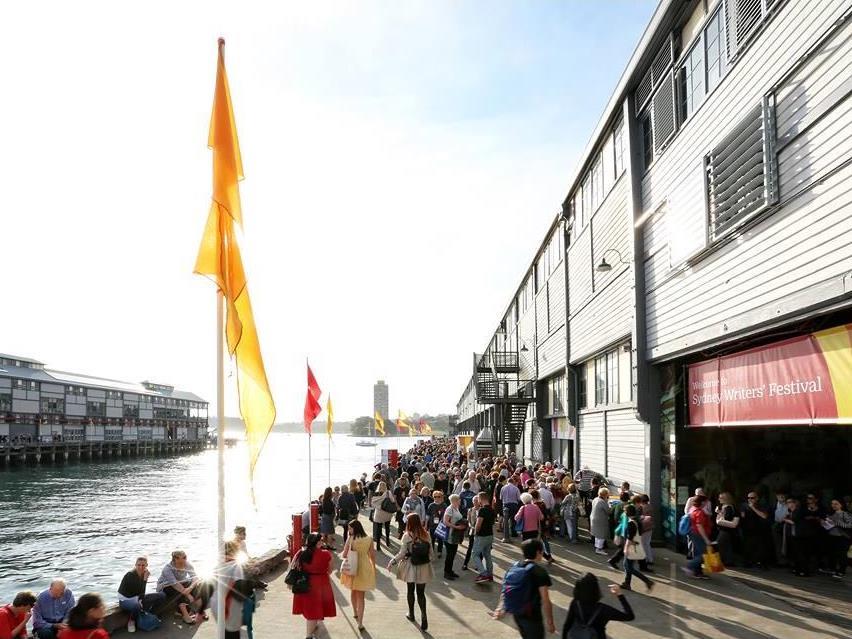Image: Sydney Writers’ Festival.
‘The biggest myth about being a festival director is that you spend your time swanning around the world seeing shows you like,’ said Simon Abrahams, Creative Director and CEO of Melbourne Fringe.
‘There’s little swanning, and even fewer shows you like, and that’s not your job anyway. Your job is to create a context where putting different artwork together makes meaning that, presented separately, wouldn’t exist.’
The Artistic Director of a festival needs to be good at developing partnerships and maintain a clear vision of what the festival will set out to do.
Lisa Dempster, Director/CEO of Melbourne Writers Festival describes the gig in pragmatic and unglamourous terms. ‘Fundraising, overseeing marketing and production, setting strategic priorities and ensuring the ongoing sustainability of the organisation and satisfaction of its staff is a big job. And all within really strict deadlines and timelines.’
And one of the biggest challenges can be that ‘your entire year revolves around a single week,’ added Michaela McGuire, Sydney Writers’ Festival Artistic Director and previously Director of the Emerging Writers’ Festival in Melbourne.
‘There’s an annual cycle of thinking, reading, working manically, then the post-festival slump. There are thousands of decisions to be made, big and small, each leading up to what you hope is a unique, transformative, meaningful and thoughtful series of events for artists and audiences alike. You also have to hope that other people will show up! A lot of your year can feel like the hour before the first guests start to arrive at a party.’
If these directors have not put you off, there is a pathway to becoming an Artistic Director, whether in performing arts, literature or visual arts but it’s likely to be a long one.
Start something
McGuire advised starting a monthly event or similar to ‘cut your teeth on.’
‘There are only a handful of festival director roles and they’re hugely competitive, so if you can find a way to hone your programming skills and showcase your talent, you’ll be a more favourable candidate,’ she said.
Dempster agreed, adding that starting your own event or completing an internship shows the right kind of initiative. ‘Festival Directors need to have great initiative – it’s your ideas, your vision, your decisions that make the festival what it is, so you need to start developing those skills as early as possible.’
Find the right development opportunity
McGuire also said aspiring Artistic Directors should get involved with their favourite festivals. ‘Lots of festivals, EWF included, offer professional development opportunities for arts workers to gain really useful experience.’
The Emerging Writers’ Festival has the Creative Producer program that allows interns to take ownership of a key event with the support of the EWF team.
Jane Howard, Director of the 2016 Digital Writers’ Festival, participated in the Adelaide Film Festival’s Emerging Curators program to develop her skills in festival programming.
Howard also worked in other roles in arts organisations to build her portfolio, writing the program copy for the Adelaide Festival of Ideas, and working in administration at the Mercury Cinema.
She said this early experience allowed her ‘to learn from senior programmers and grow to contribute my own programming ideas; or from finding small collaborative opportunities like working with some friends from Adelaide’s Format to program events for the Festival of Unpopular Culture.’
Learn from others
Howard said the choices she made throughout her career so far weren’t directed by a goal to become a festival director.
But her participation in the arts across a series of varied projects – including theatre, live art, puppetry, film, ideas, writing and literature – has made her good at the job.
‘Coming to programming at DWF, having been an audience member and an artist at previous DWFs and other writers’ festivals was hugely important to seeing how the pieces work together.
‘I think the best training I got in programming was in being an arts critic, as unanalogous as that sounds: my criticism has long been intrigued by the art of curation and the role of programmers and directors, choosing whenever I can to step back and look at a program as a whole rather than as a series of unrelated events. It is a non-specific, ad-hoc, self-directed inquiry and education, but critique of other’s programming continues to teach and inspire me.’
Dempster also came to festival programming through her passion for the industry rather than specific training in arts programming.
‘I was an indie publisher and blogger and went to many writers festivals aimed at young and emerging artists – both as an audience member and as a speaker. Because of my enthusiasm and commitment to the sector, I was invited to be on a programming committee for Emerging Writers’ Festival. My first job in festivals was as the Artistic Director/CEO of Emerging Writers’ Festival and I got there without prior experience working in the arts or festivals, though my skills in publishing were transferrable. After three successful EWFs, I was an Asialink resident at the Ubud Writers & Readers Festival then landed the gig as AD/CEO of Melbourne Writers Festival.’
A piece of advice
‘You must love the work of it. Particularly in the early days,’ said Howard.
To help she suggested surrounding yourself with people you trust and who care about you and know it’s ok to take a break. ‘One of the most important pieces of advice I was given in my career was a much senior arts worker telling me I could stop for six months and it would be fine. Take time to breathe and re-evaluate and take care of yourself: your work, your career, and your self will always be better for it.’





